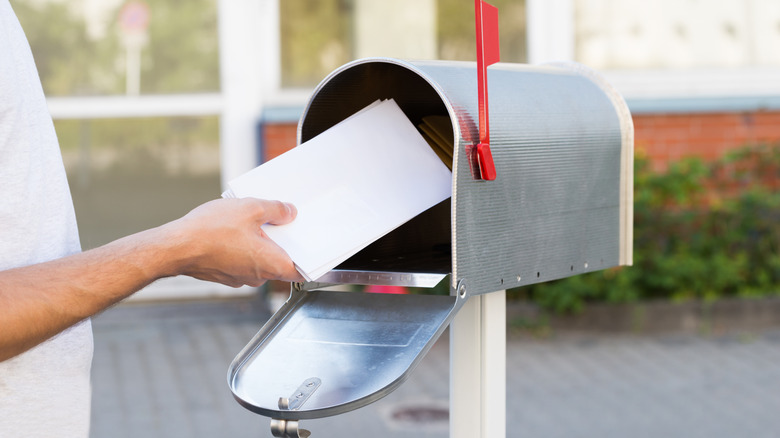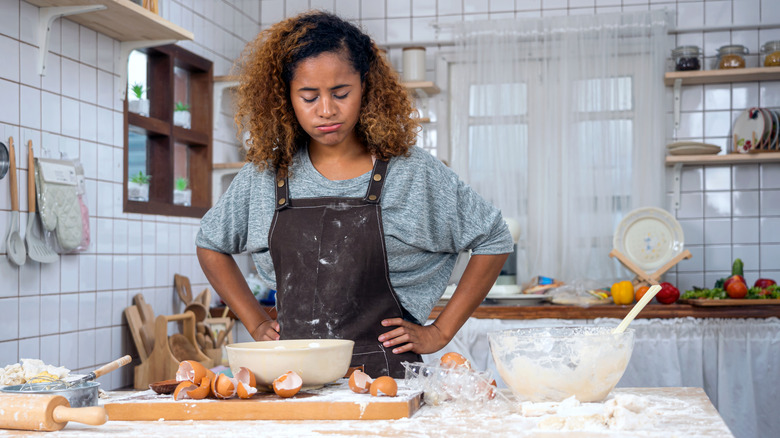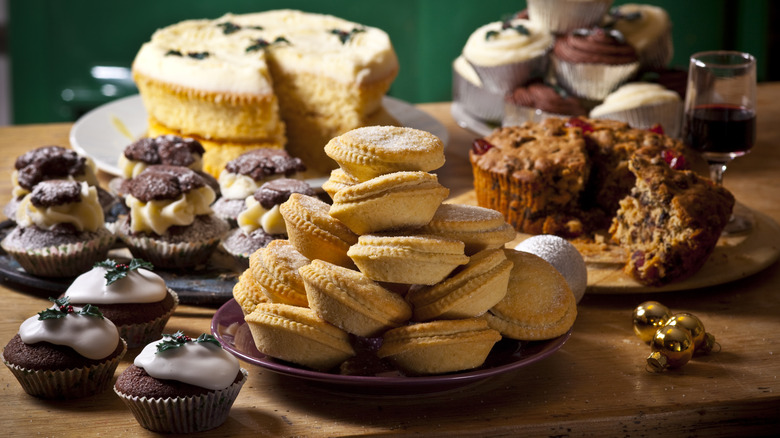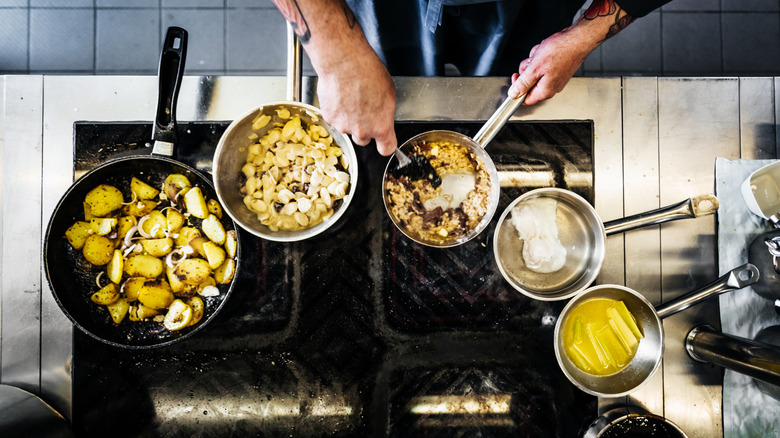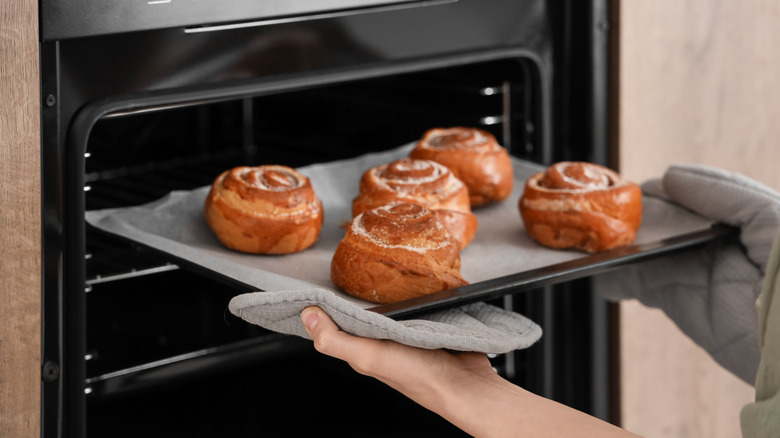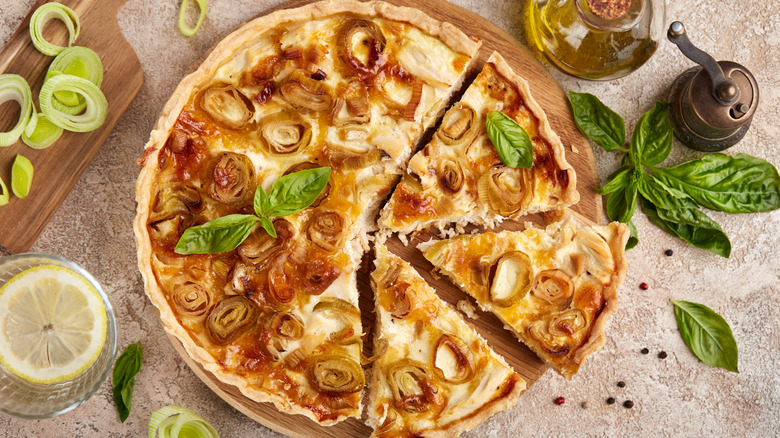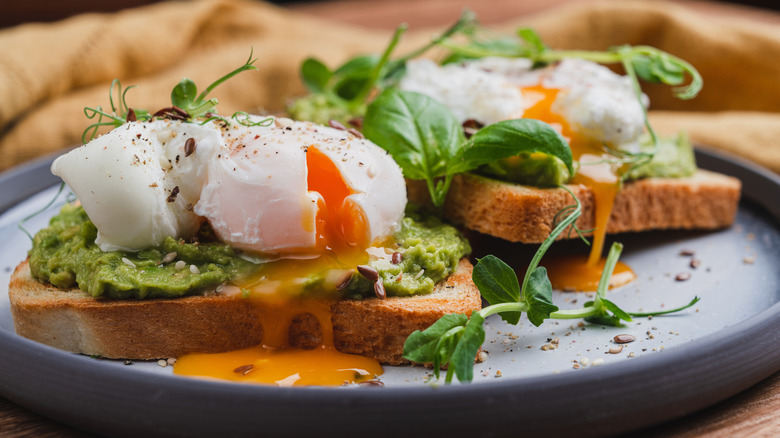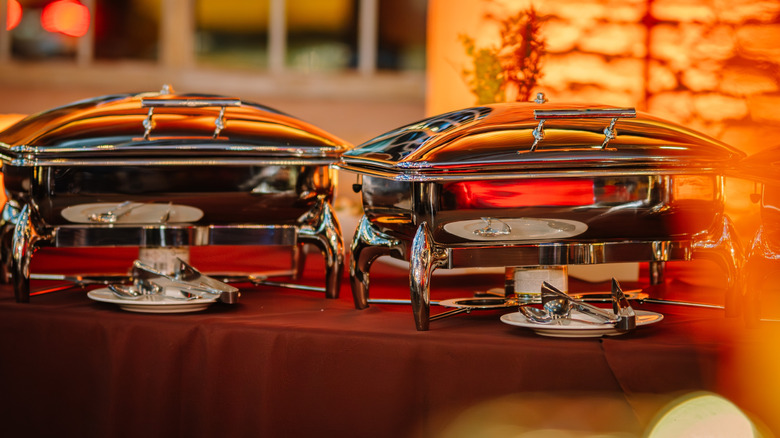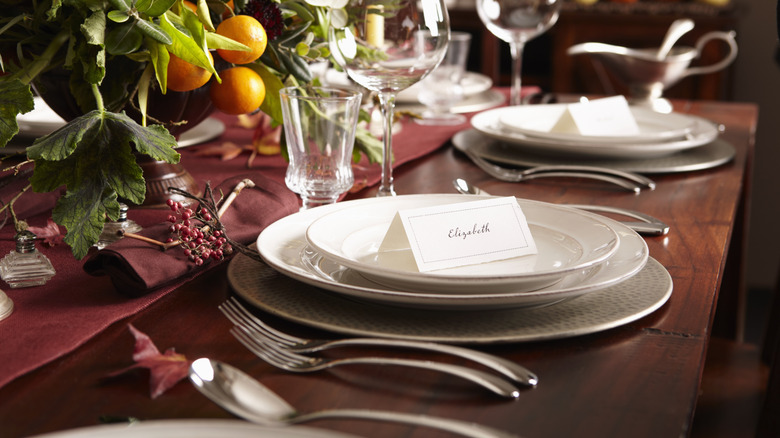14 Mistakes To Avoid When Hosting Brunch For The Holidays And Beyond
We may receive a commission on purchases made from links.
Hosting a brunch is a wonderful way to get the day off to a festive start. Gathering friends and family and sharing a special meal together can allow you to catch up, relax, have fun, and enjoy delicious food. However, hosting brunch (any time of year) can be a large undertaking. And, unfortunately, with so many things that can go wrong, your special event may not go off as planned.
Below is a list of common mistakes people make when hosting brunch. These errors may result in big problems — including running out of food, serving a cold meal, leaving guests unimpressed, or even stressing yourself out more than is necessary. Learning how to avoid these common mistakes — during the holidays and even beyond the holidays — is crucial if you want to make sure your brunch goes off without a hitch ... and that your guests leave with full tummies and joyful smiles.
Sending invitations out too late
One key component of a successful brunch is getting friends and family members you invite to show up. This isn't going to happen if you don't provide guests with enough notice about your event. Everyone is busy — especially during the holidays. And if it's beyond the holidays, you still don't want to wait until the last minute to send out invitations, because it's much more likely many people will already have other plans for the day of your event.
So, when should you send invitations out? Assuming the guests you're inviting are local, aim to get invitations out about a month before the big day, but definitely no later than two weeks before. When you send out invitations, don't forget to remind guests to RSVP to let you know if they're coming. Be sure to also add a deadline for RSVPs to be submitted; this way you'll be able to plan food for everyone and can follow up with those who may have misplaced their invitation or who need a reminder to let you know whether they'll be able to attend.
Waiting until the last minute to start planning the meal
Even before you have a finalized guest list, it's important to start planning what you want to serve for brunch. If you wait too late to decide what you want to serve, you're only setting yourself up for something to go wrong. The ingredients you need might not be available at the store, you won't have as much time to prepare things ahead, or you might not have the right serving or baking tools to make a certain recipe.
While you can finalize ingredient quantities and hold off on going to the grocery store until you've received most of your RSVPs, start working on the brunch menu early. Check your pantry for any ingredients you have on hand and make a list of what you'll definitely need to pick up at the store. Consider choosing recipes that have some overlapping ingredients to keep you from getting overwhelmed and trying to juggle (and shop for) several more specialized options.
Choosing overly complicated recipes
One rookie mistake people make when hosting brunch — whether during the holidays or another special event, or simply just because — is choosing recipes that are too involved. Whether you're hosting an intimate brunch with only a few close friends or will be serving a crowd, you don't want to spend all your time in the kitchen trying to follow a complicated recipe. Save the multistep recipes that require 30 minutes or more of prep time for another occasion and look for simple (and delicious) options that won't make you feel like you're chained in the kitchen while all your guests are socializing in the other room.
With everything going on around you, you'll also be opening yourself up to making an error, potentially ruining your chosen dish. So, instead of planning to make individual berry tarts, for example, each intricately decorated, you're better off choosing to make sheet pan pancakes, which are much better suited for feeding a crowd.
Forgetting to consider dietary preferences or allergies of your guests
As you're planning the menu for your brunch, consider whether any of your guests have allergies, food sensitivities, or specific dietary preferences. The last thing you want is for one of your guests to feel like there isn't anything safe or in-line with their dietary needs when they come to your gathering.
To avoid this being a problem, follow Guy Fieri's top tips for building a not-boring party menu and offer a variety of options. Include a mix of meat-based and vegetarian dishes as well as options free of common allergens, such as peanuts, dairy, or gluten. Brunch (no matter what time of year) is all about savory and sweet dishes, so be sure to strike the right balance between both offerings to make sure everyone will find something they can enjoy. You might not already know about the specific dietary restrictions or needs of all of your guests. Consider reaching out to each of them before you finalize your menu to ensure you're being the most inclusive host possible.
Failing to buy enough food for all the guests
Once you have your menu and guest list finalized, it will be time to shop for all the ingredients you'll need for the brunch. While this may seem like a pretty straightforward step, it's not as simple as it seems. If you don't properly calculate how much food you'll need,you might not have enough to feed everyone. Imagine how your guests (and you) would feel if the chafing dish with scrambled eggs was emptied when there were still three people waiting to serve themselves?
When deciding how much food to buy, always err on the side of overbuying instead of under-buying. While there aren't any hard and fast rules about how much you should buy — and it can vary based on the specific guest list and whether any of the attendees will be children — you should aim to have the equivalent of about 1 pound of food per person — this can include 2 to 4 ounces of appetizers, around 7 ounces of protein, and nearly 1 cup of a side dish per person, a slice of cake or pie for each guest, or around 5 ounces of ice cream, and plenty of tea and/or coffee.
Making a new recipe for the first time
Experimenting with new recipes can be exciting. You get to learn new cooking techniques and try different and interesting flavor combinations. However, your holiday brunch isn't the right time to make a new recipe for the first time. As you've likely experienced before, preparing something for the first time doesn't always go as planned. Whether you have difficulty following one of the steps, accidentally mix the ingredients in the wrong order, or find out the suggested cook or bake time was way off, things can, and do, go wrong.
You don't want to deal with these unexpected hiccups when you're preparing food for your guests at brunch. It's best to stick to familiar recipes you've prepared several times. This way, you know the steps to follow to make sure each dish comes out as it should. If you do want to make something new for your brunch, work in a few opportunities to practice preparing it ahead of the big event. This will allow you to perfect your technique, assess cook or bake times, and ensure the finished dish is tasty and something you'd want to serve.
Not accounting for stovetop/oven space
While it's important to offer a variety of dishes to ensure there is something for all your guests to enjoy, don't forget to account for available space in the oven or on the stovetop. When planning your meal, you'll need to think about which items you'll be cooking or heating up on the morning of the event. Consider how long each of these items takes to cook, and whether you'll have enough space to fit all the pans or baking dishes you'll need.
If you're planning to cook or reheat multiple dishes in the oven at the same time, also consider oven temperature. For example, if you want to make a pan of roasted potatoes, they will need to cook in a much hotter oven than the Hawaiian French toast you plan to warm up before serving it to your guests. Trying to cook these two items at the same time would alter the cooking time and/or texture of the items, so it wouldn't be the best idea. This goes for doubling-down on many other foods that just don't work together tandem in the oven — be sure to check the recipes closely so you don't make this mistake for any type of brunch you're planning.
Not timing the meal properly
When you're planning brunch, the last thing you want is for the timing to be off when serving the meal. Beyond sticking to the start time you shared with your guests, you also need to ensure all of the items are hot and ready to enjoy at the same time. If you're still flipping pancakes when everything else is cooked and ready to serve, it can create a big problem. Either, the rest of the dishes will get cold as you try to finish up, or you'll likely serve brunch in stages and won't have a complete meal ready for your guests.
To avoid this potentially disastrous situation — not to mention embarrassing — creating a timeline is essential. Start with the time you want to serve the meal and work backward from there. For each dish, determine when it should go in the oven or on the stove so that it's ready at the set time. Be sure to factor in the time that will be needed to preheat the oven, mix the ingredients, and perform other key steps in each recipe to determine when you should start making each dish.
Not cooking some dishes ahead of time
You shouldn't overlook how beneficial it can be to choose at least a few dishes you can prepare ahead of time when hosting brunch for friends or family during (and beyond) the holidays. You're going to be very busy on the morning of the event, so even taking a few things off your plate can have a huge impact.
Consider making a breakfast casserole the night before that will only need to be removed from the fridge and heated in the oven. Other dishes you can prepare ahead of time include quiches, pastries, charcuterie boards, and fruit salads. Even if one of your recipes must be cooked on the day of the event, you can still probably do some of the prep the night before. For example, if you're planning to serve omelets, chop up the veggies and meats ahead of time to help ensure a smooth morning. Similarly, you could also pre-mix the dry ingredients for other recipes you plan to prepare.
Not being prepared to serve cocktails
Cocktails and brunch go hand-in-hand. Therefore, you'll want to make sure you're ready to mix up some delicious drinks — but there are a few mistakes that could stand in your way of delivering on this. One is failing to have all the necessary ingredients you'll need to make the cocktails. When planning the event, decide which cocktail recipes you're going to make — you can't go wrong with Bloody Marys or mimosas for brunch, whether it's a holiday or not — and list out the ingredients you'll need. If you're making batch cocktails to serve a crowd, don't forget to calculate how much water or ice you'll need to balance each drink. Once you have the ingredients list, move everything over to your shopping list. Remember, a 750-milliliter bottle of alcohol will make approximately 16 beverages. If using mixers, you'll need about 2 quarts for each five to six guests.
To avoid making a mistake when mixing cocktails during your brunch, leave time to practice. Make sure you have the appropriate mixing tools, glassware for serving cocktails, and the right type of ice. Taste your sample creations so you're confident guests will enjoy them.
Serving individually plated meals
There are two main options to choose from when hosting any brunch. You could either serve individually plated meals, or you can lay all the food out buffet-style. Do yourself a favor and don't make the mistake of trying to serve individually-plated meals for each guest. There are several reasons why a buffet is the better option when hosting brunch. First, it will greatly simplify your life as the host — assembling a plated meal for each guest can be tedious. You'll spend much more time laying everything out on each plate than you would moving the larger serving bowls and dishes to a counter for buffet service.
Serving a plated meal may also have the unintended effect of making your guests feel uncomfortable. If they don't like — or worse, are allergic to — something on the plate, they might feel they're being rude by not eating it. With a buffet, everyone has the freedom to fill their plate with items they enjoy.
Letting food get cold
While a buffet is the way to go when it comes to brunch, be careful to avoid letting food get cold before your guests serve themselves. Getting your timing right is one important piece of this puzzle, but it isn't the only thing you can do to make sure you're not serving your guests cold eggs or pancakes.
Chafing dishes — like this six-pack from Alpha Living — are one of the best solutions. They elevate food items above a heat source to ensure it doesn't get cold. If you regularly host parties, you could also consider a reusable option, such as the Proctor Silex Buffet Server & Food Warmer. The Crock-Pot 7 Quart Slow Cooker and other similar models can also be a valuable asset when setting up a buffet. Most offer a "keep warm" setting that will ensure your dishes don't get cold — but that they also don't turn out dry or overcooked.
Saving all the set up and decorating until the morning of the brunch
Anything you can do to alleviate some stress on the day of the brunch can make a huge difference on your well-being. For this reason, don't wait until the morning of your event to start putting up decorations or setting the table. If you wait until the final moments, you're going to feel rushed, and the table might not look as nice as you were planning. Trying to set the table right before guests arrive — or worse, afterward — will also pull you away from something else you should be doing — that recipe in the oven might get forgotten and end up burnt, or you might fall off your timeline and miss starting a recipe.
Instead, take care of decorating and setting the table the night before your brunch. This will give you time to attend to the small touches — such as flower arrangements and other details. It will also help you avoid problems if it were discovered the next morning. For example, if the table cloth you plan on using is wrinkled or was accidentally put away dirty, you'll still have time to iron or wash it.
Not accepting help
We get it. You want to be an excellent host. You can still achieve that status without completely overextending yourself and making it impossible for you to enjoy brunch too. There is nothing wrong with accepting help from guests. Don't feel guilty about asking someone to carry a serving dish to the buffet or to grab the drinks out of the fridge before you're ready to serve the meal. If someone offers to bring something, let them. They wouldn't offer if they weren't willing to help, and it will take one more thing off your giant to-do list.
Remember, the reason you're probably hosting brunch is to enjoy a meal and spend time catching up with friends and family — but that won't be possible if you're completely overrun. Don't sweat the small stuff, ask for help ... and you (and everyone else) will enjoy the fruits of your labor.

